Intel Core i5-8600K Review: Coffee Lake's Jolting Value
Why you can trust Tom's Hardware
VRMark, 3DMark & AotS: Escalation
VRMark & 3DMark
We aren't big fans of using synthetic benchmarks to measure game performance, but 3DMark's DX11 and DX12 CPU tests provide useful insight into the amount of horsepower available to game engines.
Futuremark's VRMark test lets you gauge your system's suitability for use with the HTC Vive or Oculus Rift, even if you don't currently own an HMD. The Orange Room test is based on the suggested system requirements for current-generation HTC Vive and Oculus Rift HMDs. Futuremark defines a passing score as anything above 109 FPS.
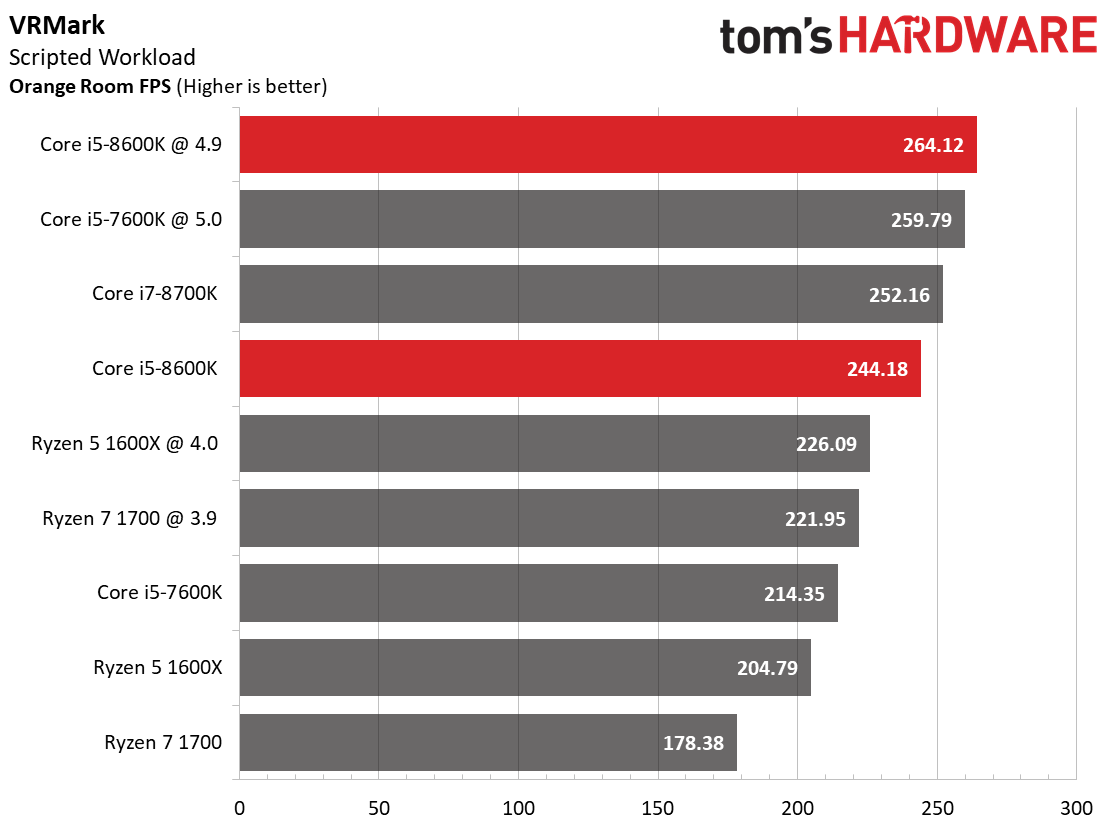
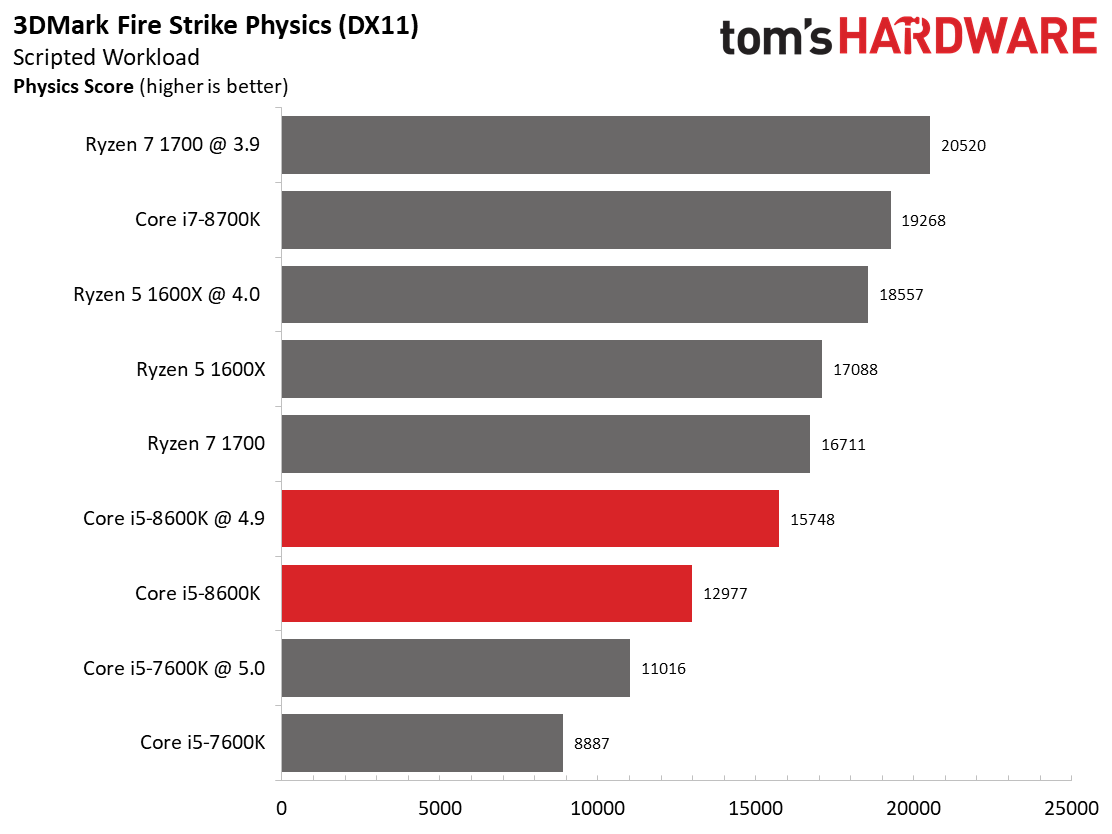
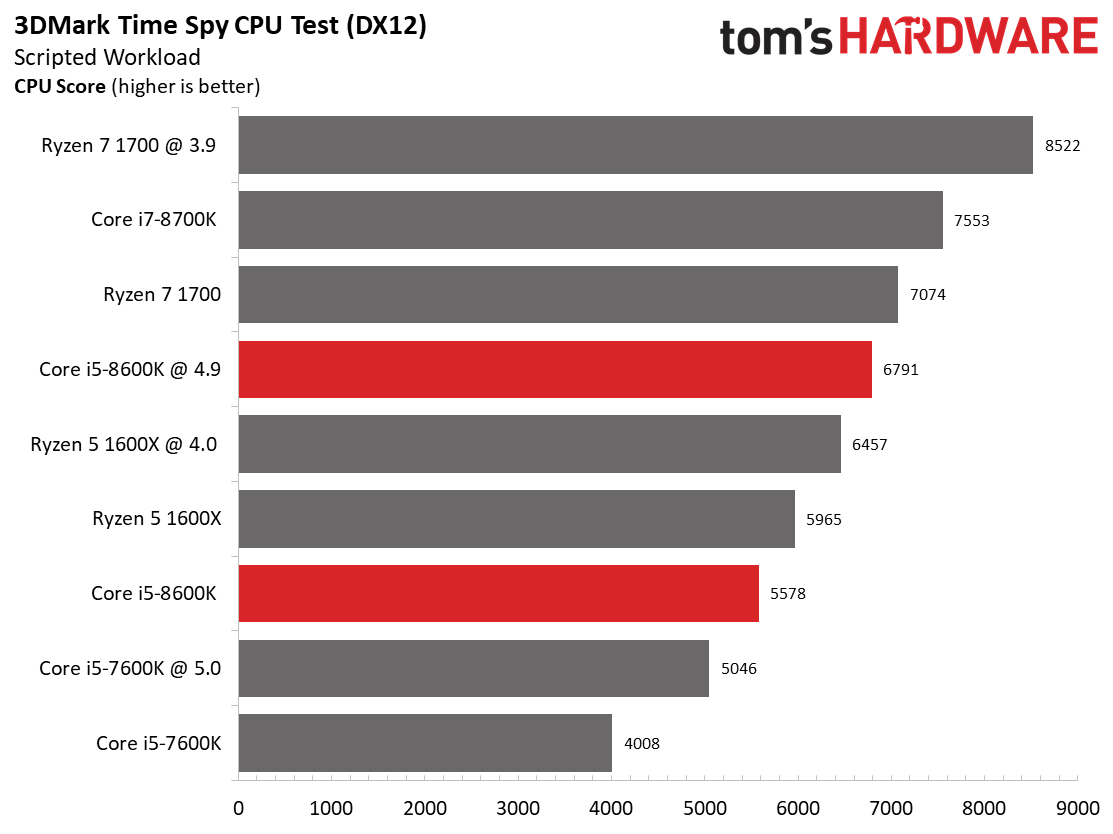
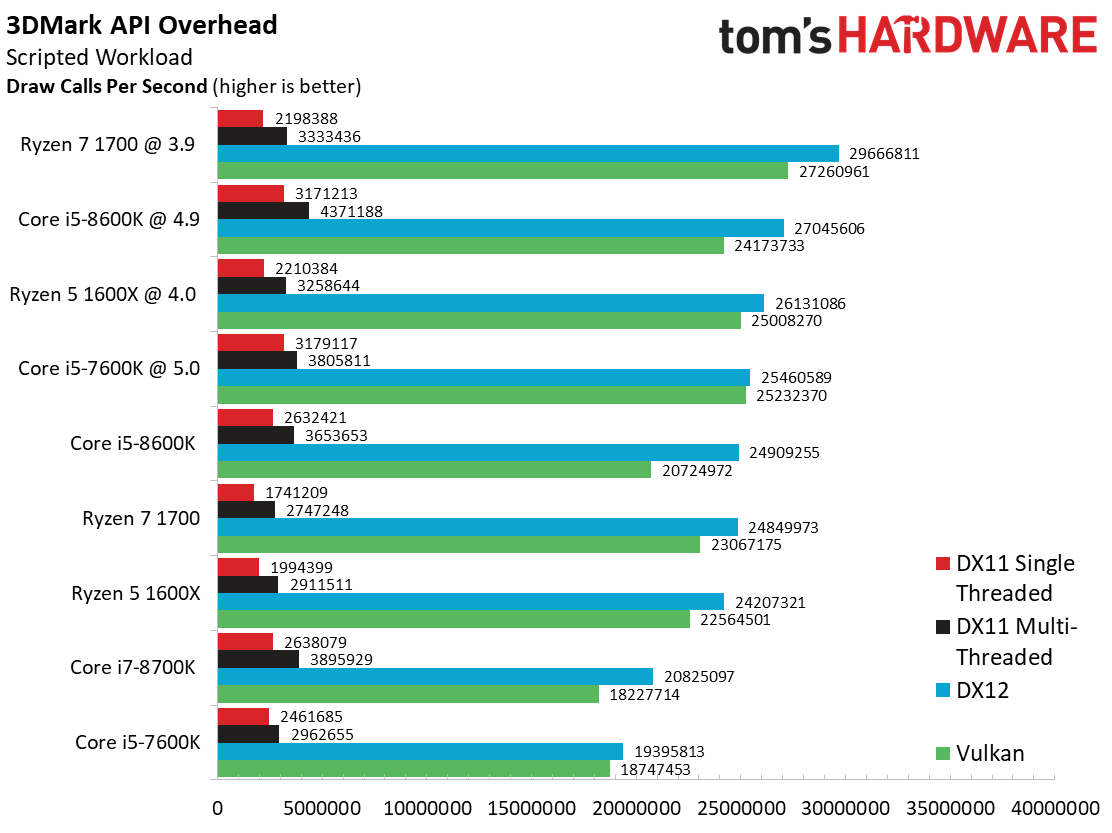
The stock Core i5 models score well in VRMark, with Coffee Lake enjoying a quantifiable advantage over its predecessor. Both CPUs trail the beefy Core i7-8700K, though. Tuning naturally improves performance, with Core i5-8600K taking a lead after overclocking.
AMD's Ryzen processors operate at lower base frequencies and aren't as fast per clock cycle, so they occupy the bottom of our chart at stock settings. Specifically, Ryzen 7 1700 employs the lowest base clock rates in our test pool and starts in last place. Clearly, though, overclocking helps it quite a bit.
The DX11 and DX12 tests want as many threads as they can get, pushing the previous-generation Core i5 to the bottom of both charts. Intel's six-core -8600K does benefit from its higher core count. But it cannot catch the Ryzen CPUs during the DX11 benchmark. It fares better under DX12, and tuning even boosts it past the competitive Ryzen 5 1600X.
Ashes of the Singularity: Escalation
Ashes of the Singularity: Escalation also scales well with thread count. Although many enthusiasts associate this game with AMD (Mantle, anyone?), remember that it didn't run well on Ryzen processors at first. A series of patches subsequently rectified the most glaring issues on Ryzen platforms.
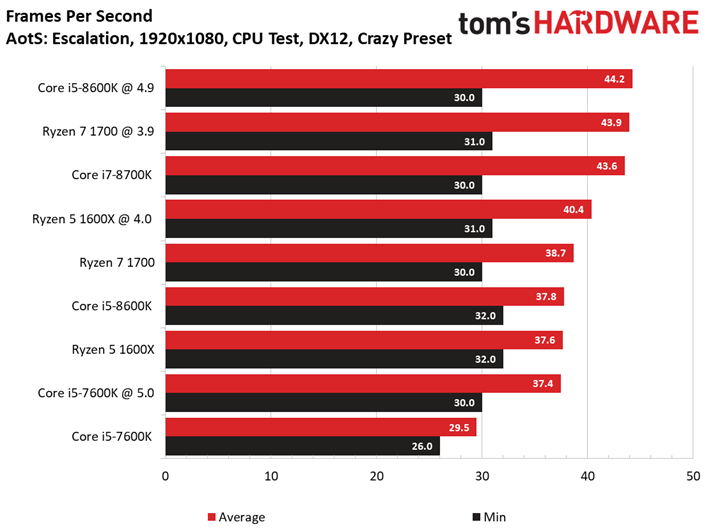
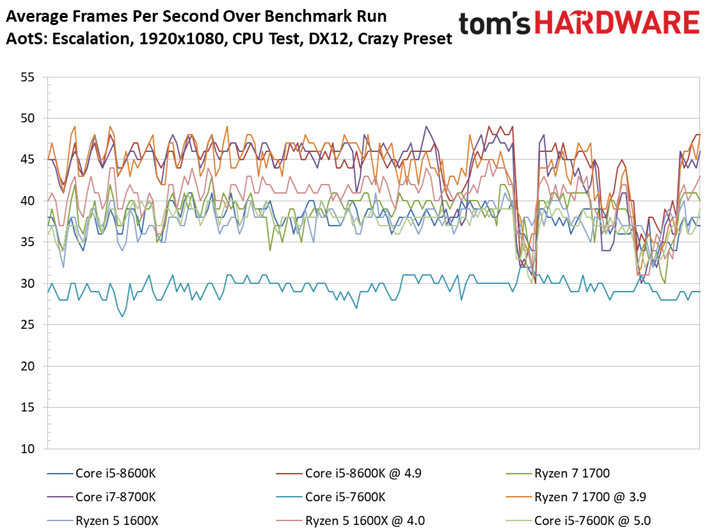
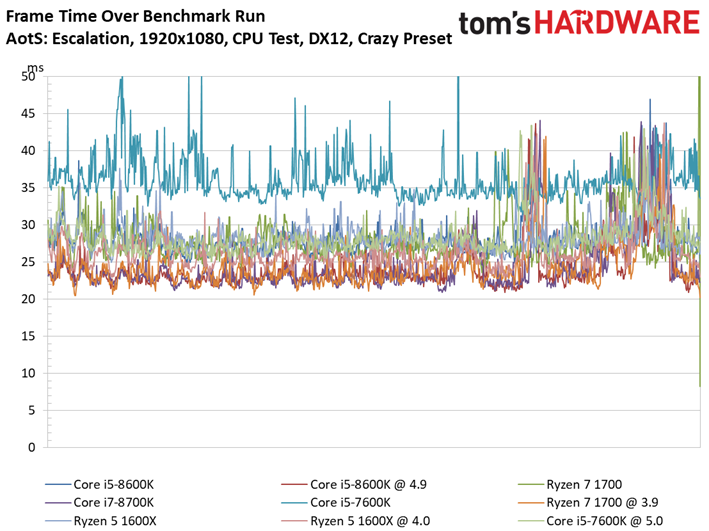
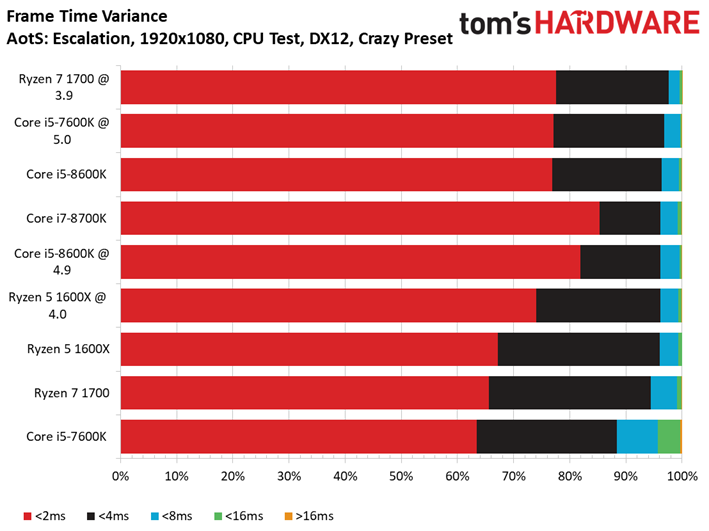
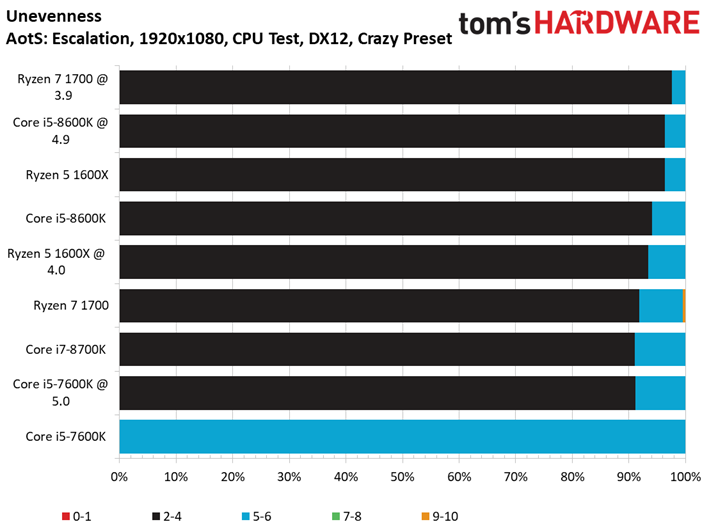
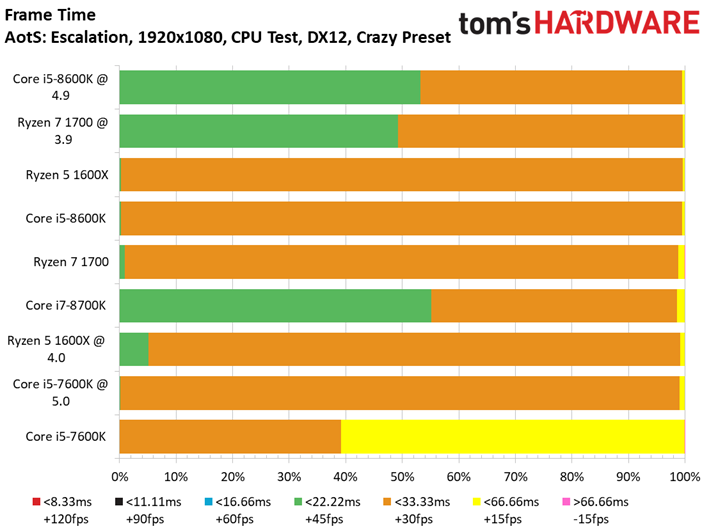
The Ryzen 7 1700 carves out a win against the -8600K at stock frequencies. Tuning the Coffee Lake-based Core i5 yields a 14.5% speed-up, which is solid scaling considering the 19.5% clock rate increase (from 4.1 GHz). That technically pushes it up over Ryzen 7 1700, though they're tied for all practical purposes.
Get Tom's Hardware's best news and in-depth reviews, straight to your inbox.
Comparing Core i5-8600K to the previous-gen -7600K illustrates the significance of more cores in a game optimized for parallelization.
Ryzen 5 1600X also gains quite a bit of performance from overclocking, proving its relevance to this comparison. Remember that we're looking at a much cheaper processor/motherboard combo, after all.
MORE: Best CPUs
MORE: Intel & AMD Processor Hierarchy
MORE: All CPUs Content
Current page: VRMark, 3DMark & AotS: Escalation
Prev Page How We Test Next Page Civilization VI, Battlefield 1 & Dawn of War III
Paul Alcorn is the Editor-in-Chief for Tom's Hardware US. He also writes news and reviews on CPUs, storage, and enterprise hardware.
-
logainofhades Great CPU, but the overall platform cost is a bit of a turn off, for me. I'd rather get a 1600, and a B350 board, to allow for a better GPU, if buying new. As stated in the review, even a 1700, with a less expensive board, is a very compelling option.Reply
-
AS118 Seems like a good product, but I'd like to see what the 8600 and 8500 non-k offers, and perhaps next year with the B360 boards that give them a more budget "locked cpu" option.Reply
I also feel that the availability will be low for Coffee Lake until the end of this year, particularly throughout the holiday season. Due to that concern (as well as the total cost of platform ownership) I think that Ryzen with its 1600 and 1700 CPU's along with the 1600x will be the value kings this year, with Coffee Lake not hitting it's stride until early next year.
The fact that AMD's stuff doesn't have the same availability issues makes it a strong contender, imho, although Black Friday and Christmas sales will also like make Kaby Lake (and even Sky Lake) stuff at clearance prices appealing too, despite the lack of cores you'll find in Ryzen and now Coffee Lake. -
almostdecent Since the chart shows the i5-8600k and the i5-8600K@4.9GHz at the same $260, I presume that means you achieved the overclock with the stock cooler.Reply -
ammaross It's kind of disappointing to see so many benchmarks where an i5 does as well or better than it's i7 counterpart. It just shows how poorly threaded some of these applications really are and almost necessitates running two benchmarks simultaneously to really judge the merit of these multi-core CPUs. Maybe run the photoshop test while rendering with After Effects or run a game benchmark while doing CPU h.265 handbrake.Reply -
almostdecent It is worth mentioning that this is essentially a paper launch at the moment, since none of the Coffee Lake processors are available anywhere.Reply
http://www.nowinstock.net/computers/processors/intel/
and the rare place that has any, such as Microcenter, have gouging prices. Such as selling the plain i7-8700 (not the K version) with an MSRP of $300 for sale for $429.
http://www.microcenter.com/product/486087/Core_i7-8700_Coffee_Lake_32_GHz_LGA_1151_Boxed_Processor -
InvalidError Reply
On September 20, Intel responded to a story about yet another 10nm schedule slip by saying that Cannon Lake will begin shipping in limited quantities to some laptop manufacturers with production ramping up in 1H2018. Limited Coffee Lake volume could be due to Intel deciding to upgrade production lines to 10nm for Cannon Lake instead of 14++.20281291 said:I also feel that the availability will be low for Coffee Lake until the end of this year, particularly throughout the holiday season. -
TJ Hooker Reply
Not sure if you were being sarcastic, but the 8600K doesn't have a stock cooler.20281420 said:Since the chart shows the i5-8600k and the i5-8600K@4.9GHz at the same $260, I presume that means you achieved the overclock with the stock cooler.
There are two different sets of graphs, one that looks at CPU only costs and the other that considers CPU, mobo, and cooler costs. In the latter, the 8600K at 4.9GHz is clearly shown to cost more.
-
InvalidError Reply
Intel hasn't included a stock HSF with their unlocked CPUs since Skylake so on top of paying more for the unlock, you also get shafted by the price of a stock cooler which you no longer get on top of it. You need an aftermarket cooler for both stock and OC.20281420 said:Since the chart shows the i5-8600k and the i5-8600K@4.9GHz at the same $260, I presume that means you achieved the overclock with the stock cooler.
Same thing with AMD's Ryzen nnnnX CPUs. -
YoAndy Reply20281216 said:Great CPU, but the overall platform cost is a bit of a turn off, for me. I'd rather get a 1600, and a B350 board, to allow for a better GPU, if buying new. As stated in the review, even a 1700, with a less expensive board, is a very compelling option.
A better GPU?//Why would you do that. at 1080p Ryzen will (bottleneck) hold back powerful GPU's, It won't give you equal performance. I bought a Ryzen for pure gaming and i ended up selling it.. -
acosta.87 Reply20281216 said:Great CPU, but the overall platform cost is a bit of a turn off, for me. I'd rather get a 1600, and a B350 board, to allow for a better GPU, if buying new. As stated in the review, even a 1700, with a less expensive board, is a very compelling option.
B350 VRM's are pretty low quality for any sort of OC unless it's a mild one so for me that's a no go. If you're primarily into gaming then the 1600 has nothing on the i5, it simply trails it whether at stock settings or OC'd and even at productivity it beats a 1600 Ryzen processors in most task even with a 6 thread deficit so it's a pretty good investment overall.